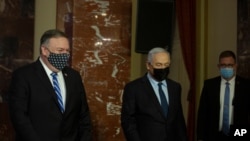U.S. Secretary of State Mike Pompeo today became the first senior U.S. official to visit a Jewish settlement in the West Bank. He also announced that from now on, goods made in Jewish settlements in the West Bank will be labeled Made in Israel. The visit is expected to be his last before President-elect Biden is inaugurated.
The State Department announced that products made in Jewish settlements can now be labeled “Made in Israel” which is a change in U.S. policy. Until now, all settlement produce was labeled “Made in the West Bank.”
The statement came as Pompeo visited the Psagot Winery in the settlement of Psagot, near the Palestinian city of Ramallah. It was the first time a senior U.S. diplomat has visited a Jewish West Bank settlement.
After the U.S. declaration a year ago that Jewish settlements are not illegal, the winery named a bottle after the Secretary of State.
Several dozen Palestinians like Abdul Jawad Saleh, a Palestinian American citizen, protested against Pompeo’s visit to the settlement. They say the West Bank, along with the Gaza Strip and east Jerusalem must become a Palestinian state.
"We tell the Americans, when you drink that wine, you are drinking the blood of the Palestinian people, and the smell- aroma you have, is the smell of the sweat of the Palestinian farmers," said Abduljawad Saleh, a Palestinian-American citizen.
Others said that President Trump is on the way out, and they will continue fighting for their rights.
"This visit means nothing," said Laila Ghanem, governor of Ramallah and al-Bireh. "(Trump) He is the person who took the side of settlers and settlements the most, and declared that Jerusalem is the capital of this terrorist state (Israel). He is gone and the right will return to its owners no matter how many years it will take, as there is no occupation that lasted long on this earth."
Pompeo then continued to the Golan Heights, a territory that Israel captured from Syria in 1967 and later annexed. While most of the international community does not accept the annexation, President Trump again changed U.S. policy and recognized it as part of Israel.
“Today I’ll get a chance to visit the Golan Heights," he said. "The simple recognition that this is part of Israel too was a decision that President Trump made that is historically important and simply a recognition of the reality."
Perhaps even more galling for Palestinians was Pompeo’s statement regarding the Boycott, Divestment and Sanctions -- or BDS -- Movement.
He spoke at a joint news conference with Israeli Prime Minister Benjamin Netanyahu.
“Today I want to make one announcement with respect to a decision by the State Department that we will regard the global anti-BDS campaign as anti-Semitic," said Pompeo. "I know this sounds simple to you Mr. Prime Minister, it seems like a statement of fact but I want you to know that we will immediately take steps to identify organizations that engage in hateful BDS content and will withdraw U.S. government support for such groups.”
In a statement, the BDS movement said it rejects all forms of racism, including anti-Jewish racism, as a matter of principle.





